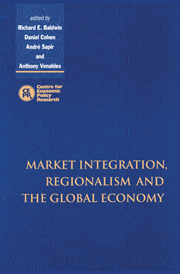Book contents
- Frontmatter
- Contents
- List of figures
- List of tables
- Preface
- Acknowledgements
- List of conference participants
- 1 Introduction
- PART ONE REGIONALISM AND THE GLOBAL ECONOMY
- PART TWO MARKET INTEGRATION AND REGIONALISM
- 7 Operationalising the theory of optimum currency areas
- Discussion
- 8 European migrants: an endangered species?
- Discussion
- 9 Geography and specialisation: industrial belts on a circular plain
- Discussion
- 10 Convergence … an overview
- Discussion
- 11 Convergence as distribution dynamics (with or without growth)
- Discussion
- Index
10 - Convergence … an overview
Published online by Cambridge University Press: 24 February 2010
- Frontmatter
- Contents
- List of figures
- List of tables
- Preface
- Acknowledgements
- List of conference participants
- 1 Introduction
- PART ONE REGIONALISM AND THE GLOBAL ECONOMY
- PART TWO MARKET INTEGRATION AND REGIONALISM
- 7 Operationalising the theory of optimum currency areas
- Discussion
- 8 European migrants: an endangered species?
- Discussion
- 9 Geography and specialisation: industrial belts on a circular plain
- Discussion
- 10 Convergence … an overview
- Discussion
- 11 Convergence as distribution dynamics (with or without growth)
- Discussion
- Index
Summary
Introduction
Does economic growth lead to convergence of per capita incomes across countries and/or smaller administrative units? This chapter does not provide a proper survey of the many ways in which recent theoretical and empirical work has motivated and posed this question and of the equally varied range of answers given to it. Rather, it focuses on a few basic issues. It reads in the empirical evidence a qualified ‘no’ as the answer to question posed above, and moves on to examine the implications of this potentially disturbing finding for models of accumulation and growth and for the role and desirability of policy interventions in that context. As is the case in studies of personal income inequality, the extent and character of laissez-faire market imperfections bear importantly on the answers to such theoretical (and somewhat ideological) questions.
Section 2 briefly reviews recent and less recent empirical findings on growth behaviour across aggregate economies, and the following two sections outline theoretical motivations for interest in the convergence question. If each country is treated as an independent observation, then cross-sectional growth evidence can be used to test competing growth theories. Section 3 outlines the theoretical argument underlying this line of research: along the transition path towards neoclassical growth models' steady state of exogenous growth, capital intensity increases and further accumulation encounters decreasing returns; hence, capital-poor countries should ‘catch up’ with richer ones.
- Type
- Chapter
- Information
- Market Integration, Regionalism and the Global Economy , pp. 275 - 295Publisher: Cambridge University PressPrint publication year: 1999



